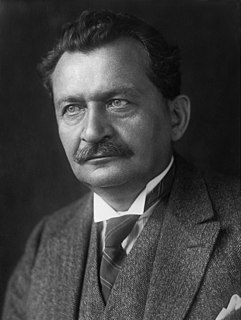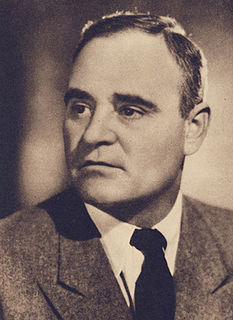
Federal elections were held in Germany on 7 December 1924, the second that year. The Reichstag had been dissolved on 20 October 1924. The Social Democratic Party remained the largest party in the Reichstag with an increased share of the vote, winning 131 of the 493 seats. Voter turnout was 78.8%.

Federal elections were held in Germany on 4 May 1924. The Reichstag had been dissolved on 13 March 1924. The Social Democratic Party remained the largest party in the Reichstag after winning 100 of the 472 seats. Voter turnout was 77.4%.

A constitutional referendum was held in France on 13 October 1946. Voters were asked whether they approved of a new constitution proposed by the Constituent Assembly elected in June. Unlike the May referendum, which saw a previous constitutional proposal rejected, the new constitution was accepted by 53.2% of voters, and brought the French Fourth Republic into existence. Voter turnout was 67.6%.

Parliamentary elections were held in Bulgaria on 18 November 1945, the country's first to feature universal suffrage for women. The Bulgarian Agrarian National Union and the Bulgarian Communist Party both won 94 seats. Voter turnout was 84.8%.
Elections to the Supreme Soviet were held in the Soviet Union on 12 March 1950.

A constitutional referendum was held in Poland on 25 May 1997. Voters were asked whether they approved of a new constitution. It was narrowly approved, with 53.5% voting in favour. Voter turnout was just 42.9%. Although the 1995 Referendum Act stated that a 50% turnout was required to validate the referendum, the Supreme Court ruled on 15 July that the constitution could be introduced.

Parliamentary elections were held in Hungary between 8 and 15 December 1926. The result was a victory for the Unity Party, which won 161 of the 245 seats in Parliament. István Bethlen remained Prime Minister.

Parliamentary elections were held in Hungary between 31 March and 7 April 1935. The result was a victory for the Party of National Unity, which won 164 of the 245 seats in Parliament. Gyula Gömbös remained Prime Minister.

Parliamentary elections were held in Hungary on 28 and 29 May 1939. The result was a victory for the Party of Hungarian Life, which won 181 of the 260 seats in Parliament. Pál Teleki remained Prime Minister. It won 72 percent of the parliament's seats and won 49 percent of the popular vote in the election. This was a major breakthrough for the far-right in Hungary.

General elections were held in Italy on 29 October 1882, with a second round of voting on 5 November. The "ministerial" left-wing bloc emerged as the largest in Parliament, winning 289 of the 508 seats.

Parliamentary elections were held in Latvia on 7 and 8 October 1922. The Latvian Social Democratic Workers' Party remained the largest party, winning 30 of the 100 seats.

General elections were held in Liechtenstein on 29 April 1945. Following the "silent elections" of 1939, they were the first to use the new proportional representation system. The Progressive Citizens' Party won eight of the 15 seats in the Landtag, but remained in coalition with the Patriotic Union.

An independence referendum was held in the Lithuania on 9 February 1991. It was approved by 93.2% of voters. The number of voters voting "yes" was 76.5% of all registered voters, far exceeding the threshold of 50%. Independence had been declared on 11 March 1990, and was achieved in August 1991.

General elections were held in Romania in June 1939. The Chamber of Deputies was elected on 1 June, whilst the Senate was elected a day later. They were the first since the introduction of the royal dictatorship of King Carol II under the 1938 constitution. Voters were presented with a single list from the National Renaissance Front, which had been the only legally permitted party in Romania since December.

Parliamentary elections were held in Romania on 3 February 1957. Voters were presented with a single slate of candidates from the People's Democratic Front, which was dominated by the Romanian Workers Party. The Front won all 437 seats in the Great National Assembly.

Parliamentary elections were held in Romania on 5 March 1961. Voters were presented with a single list from the People's Democratic Front, which was dominated by the Romanian Workers Party. The Front won all 465 seats in the Great National Assembly.

Parliamentary elections were held in Romania on 7 March 1965. Voters were presented with a single list from the People's Democratic Front, which was dominated by the Romanian Workers Party. The Front won 465 seats in the Great National Assembly.

A referendum on the electoral law was held in San Marino on 22 September 1996. Voters were asked four questions on changes to the electoral law and electoral system, all of which were approved by voters.
Two referendums were held in Switzerland in 1887. The first was held on 15 May, asking voters whether they approved of a federal law on spirits, and was approved by 65.9% of voters. The second was held on 10 July, asking voters whether they approved of an amendment made to article 64 of the federal constitution, and was approved by 77.9% of voters and 20.5 cantons.
A referendum on the armed forces was held in Switzerland on 3 November 1907. Voters were asked whether they approved of the organisation of the federal armed forces. The proposal was approved by 55.2% of voters.
















